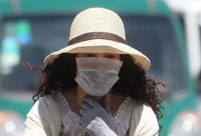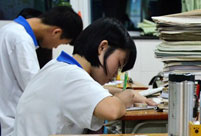 Luoyang aims to become 'Chinese Culture City'
Luoyang aims to become 'Chinese Culture City'
 Century-old jade disc found confirms ancient legend
Century-old jade disc found confirms ancient legend
 A serious mind behind Chinese leader
A serious mind behind Chinese leader
 Panda Cubs to Predict 2014 World Cup Winners
Panda Cubs to Predict 2014 World Cup Winners
 China Southern Airlines flight attendants win titles in service contest
China Southern Airlines flight attendants win titles in service contest
 Pupil's performance art persuades people to stop smoking
Pupil's performance art persuades people to stop smoking
 Nie Chenxi's clay tigers
Nie Chenxi's clay tigers
 Children's Day wishes
Children's Day wishes
 Chinese Kung Fu charms Silicon Valley
Chinese Kung Fu charms Silicon Valley
 Tranquil Yankou ancient town
Tranquil Yankou ancient town
NANNING, June 7 -- An army of almost 9.4 million examinees, slightly less than the population of Sweden, are having their dreams put to the test by China'a annual college entrance exam this weekend.
Gaokao, as the exam is known, is under examination, too. Increasingly criticized for its role in focusing the national education system on exam results rather than genuine quality, Gaokao is having its biggest overhaul since it resumed in 1977, the year after the Cultural Revolution ended.
The keyword to Gaokao reform could be decentralization. Shanghai took the lead in running its own Gaokao in 1985, and now about half the country has followed suit, with the rest retaining the unified "national" exam.
In 2003 Tsinghua, Peking and 20 other universities were given limited rights to set their own admission standards, meaning five percent of freshmen were selected not solely according to their Gaokao scores. Applicants with outstanding performances in provincial or even international science Olympiads could earn themselves handsome credit and increase their chances of being enrolled by a prestigious university, even though their Chinese literacy or English might not be up to scratch. Extra credit can also come from artistic or sporting talent.
Diversifying standards and opening the college door to a wider set of applicants with special talents was a good idea, but was scandalously abused by some universities.
Cai Rongsheng, former head of admissions at Beijing's Renmin University of China, was arrested a week ago on charges of receiving huge bribes. Cai was put under official investigation in November 2013 and Renmin suspended its private admissions for 2014 soon after. Cai is accused of taking over 10 million yuan (1.62 million U.S. dollars) to "help" students during recruitment.
Gaokao is swamped by waves of doubt on admission transparency and fairness. Supplementary scores, in particular, have been put under the microscope.
Due to lack of supervision, what were once rights of universities to admit whoever they chose, turned out to be tradable privileges for those who could afford them and led to corrupt admission procedures, said Wang Feng, charged by the Ministry of Education with the task of reforming the system.
Deng Xiuxin, President of Huazhong Agricultural University, criticized some practices in art exams. Random sketches are easily declared masterpieces by examiners bought off in advance.
"People who are not art experts have no idea about the fraud," Deng, a deputy to the National People's Congress (NPC), China's top legislature, said during this year's NPC session.
Xiong Qingnian, of Fudan University, one the country's finest, wants third parties to watch over and evaluate the admission process. It will take time for his suggestion to come to fruition, but meanwhile, 31 education authorities have cut the items that earn applicants extra admission credit.
In southwest China's Guangxi Zhuang Autonomous Region, first prize winners in national science Olympiads will no longer be given extra points. Guangxi started to readjust its policy in 2011. Winners of provincial science and technology contests and students who won merit for good virtue are no longer given extra marks.
Xiong Bingqi, vice president of the 21st Century Education Research Institute, welcomes the change. Education authorities have had to clean up these score subsidies which were such obvious fertile ground for corruption, he said.
Guangdong trimmed its items to six from 23 this year, meaning the number of applicants who can get extra scores will drop by more than 90 percent.
"This has been well received by examinees, and is widely regarded as more fair," said Luo Weiqi, head of the provincial education department.
While these measures are all well and good, there are calls for preferential treatment for Gaokao examinees from rural areas where education resources and quality are often inferior. Urbanites enjoy far more social welfare benefits than the rural population due to the urban-rural dual system introduced in the 1950s.
"For equity's sake, some compensatory policies are necessary to ensure rural student's rights and interests," said Chen Chusheng, vice president of the University of Science and Technology of China.
During the annual NPC national session this year, Chinese Premier Li Keqiang vowed to increase by at least 10 percent the number of rural students from poor areas enrolled in key universities.
For some rural students, Gaokao is a passageway to a new destiny through knowledge. Once enrolled, they become urbanites and no longer have to bear the hardship of farming like their parents, or become migrant workers like their peers who fail to make it.
 Magnificent Hutiao Gorge
Magnificent Hutiao Gorge  Heat waves hit China
Heat waves hit China Love at the construction site
Love at the construction site Graduation photos bring memories back to life
Graduation photos bring memories back to life Art school students present works in Nanjing
Art school students present works in Nanjing Xinjiang's first high-speed railway goes on trial run
Xinjiang's first high-speed railway goes on trial run 3D Sea-life Themed Art Garage unveiled in Zhengzhou
3D Sea-life Themed Art Garage unveiled in Zhengzhou
 Creative Photos go viral during graduation season
Creative Photos go viral during graduation season Students in last-minute effort for Gaokao
Students in last-minute effort for Gaokao Dali, an ideal summer vacation destination
Dali, an ideal summer vacation destination Xichan Temple's little monk hit the Internet
Xichan Temple's little monk hit the Internet Monologue of a modern dancer
Monologue of a modern dancer College girl proposes to boyfriend on Weibo
College girl proposes to boyfriend on Weibo Special operation members in counter-terrorism training
Special operation members in counter-terrorism training American football brings manhood out of boys
American football brings manhood out of boysDay|Week|Month